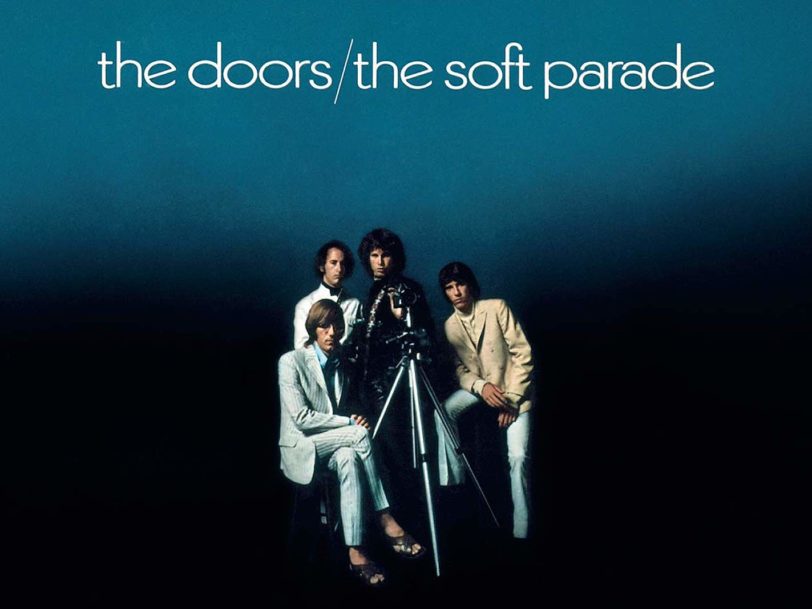‘The Soft Parade’ Track-By-Track: A Guide To Every Song On The Album
Tell All The People
A blast of horns, and a new Doors era is announced with Tell All The People, whose opening fanfare also heralds the arrival of a messiah-like protagonist summoning the hordes for the 60s’ last gasp (“Can’t you see the wonder at your feet?/Your life’s complete/Follow me down”). Guitarist Robby Krieger penned the lyrics to this slow-building call-to-arms, but though Jim Morrison had no problem with delivering grand statements, both Ray Manzarek and John Densmore have described the self-proclaimed Lizard King’s apparent dislike of the line “Can’t you see me growing? Get your guns” as a turning point for the group: “I don’t want the public to think they should ‘get their guns and follow me!’”, the drummer, writing in his memoir, Riders On The Storm: My Life With Jim Morrison And The Doors, recalled him saying.
Where on previous Doors albums the group as a whole had been credited with writing each song, The Soft Parade was the first Doors release to carry individual writing credits, allegedly because of a dispute between Morrison and Krieger over changing the lyric. But while Densmore was “surprised to see Robby get so passionate about anything. He certainly cared about his songs, and he valued Jim as his mouthpiece,” Krieger has recounted things differently in his own book, Set The Night On Fire: Living, Dying And Playing Guitar With The Doors.
“Whenever Jim wanted to change a lyric, he just did it. He was the poet. I was the guitarist,” Krieger wrote. Noting that The Soft Parade’s title track also included the line “You’d better bring your gun”, Krieger felt the change in songwriting credits “was more about Jim recognising how little he had contributed” to the album, “and feeling uncomfortable about people assuming the lyrics always came from him”. Certainly, during the recording sessions, Morrison, a UCLA film-school graduate, was devoting more of his time to editing the band’s Feast Of Friends documentary, and was readying his first two collections of poetry, The New Creatures and The Lords: Notes On Vision, for self-publication. Disillusioned with the lifestyle of the rock frontman, he brought fewer songs than usual to the studio.
“In the beginning, I wrote most of the songs,” Morrison confirmed to Rolling Stone magazine around the time of The Soft Parade’s release, before going on to highlight Krieger’s increased role in the group. “On each successive album, Robby contributed more songs. Until finally on this album it’s almost split between us.” Of The Soft Parade’s nine songs, Krieger would receive four individual writing credits and share a fifth with Morrison.
Touch Me
A crucial change to Touch Me’s lyrics was born less out of a disagreement than out of a wish to avoid confusion. Initially writing the song as Hit Me, Robby Krieger later explained how he felt that “the motions of a card game – people upping the stakes and refusing to show their hand” would be “a good metaphor for a contentious relationship” (John Densmore even suggested the song’s original opening lines, “Come on, come on, come on, come on/Now, hit me, babe,” were inspired by the rumoured “intensity of some of Robby and [his then girlfriend, now wife] Lynn’s domestic squabbles”). “Jim worried that people wouldn’t get the symbolism and would take the phrase ‘Hit me’ literally,” Krieger said. “By swapping out a single word, he changed the whole song for the better and undeniably helped Touch Me become a hit.”
Consciously or not, a commercial instinct had infiltrated the studio during the recording of Touch Me – quite literally. When the band realised the song’s closing riff sounded like the melody to a TV commercial for Ajax detergent, they chanted the ad slogan “Stronger than dirt!” on top as a joke. But with an intro that built to seven bars instead of the expected eight, Touch Me was tooled to catch the ear from the off. By adding some pop bounce and washes of crooner-era strings to their patented take on R&B, The Doors scored themselves a No.3 hit on the Billboard Hot 100.
Shaman’s Blues
“The shaman was a man who would intoxicate himself,” Jim Morrison explained to critic Richard Goldstein, for an interview that ran in New York Magazine shortly after the band began recording The Soft Parade. “And, he would put himself into a trance by dancing, whirling around, drinking, taking drugs – however. Then, he would go on a mental travel and describe his journey to the rest of the tribe.”
Ostensibly a song about a lost love, Shaman’s Blues gives some indication as to Morrison’s more troubled mindset during the Soft Parade sessions. After singing of “Cold grinding grizzly-bear jaws/Hot on your heels”, he makes a wider appeal to mercy: “Will you stop/Will you stop the pain?” Though he is remembered as one of the best rock frontmen of all time, live performance was beginning to take its toll on the man whose self-styled shaman’s dance had become a significant part of the Doors concert experience, and whose reliance on alcohol was exacerbated by the pressure he’d begun to feel as a countercultural idol whom audiences increasingly wanted more from (“The joy of performing has ended,” he wrote in a private notebook the year after The Soft Parade’s release). With such songs as Shaman’s Blues, the journey Morrison was describing was beginning to seem increasingly perilous.




